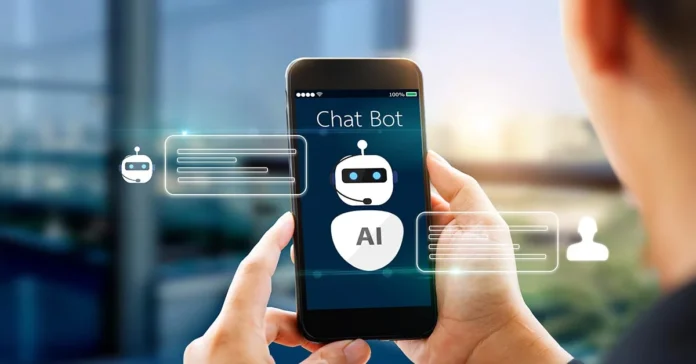In today’s fast-paced digital landscape, consumers expect immediate, frictionless communication. Businesses are responding by leveraging AI-powered chatbots to enhance customer experiences and streamline operations, particularly within popular messaging platforms like WhatsApp, Messenger, and Slack. This integration is no longer a futuristic concept; it’s a present-day necessity.
The statistics speak for themselves. According to a report by Juniper Research, “Chatbot Interactions to Reach 22 Billion Globally by 2023, Driving $142 Billion in Retail Spend.” This explosive growth underscores the pivotal role chatbots are playing in shaping the future of commerce and communication. Furthermore, a study by Salesforce revealed that 69% of consumers prefer using chatbots for quick communication with brands.
These numbers highlight the growing acceptance and preference for chatbot interactions, making their integration with popular messaging platforms a strategic imperative for businesses of all sizes.
In this article, we will discuss the top AI chatbots that seamlessly integrate with WhatsApp, Messenger, and Slack, exploring their features, benefits, and applications.
WhatsApp, with its staggering user base, has become a cornerstone of global communication. Integrating AI chatbots with WhatsApp allows businesses to provide instant customer support, personalized recommendations, and transactional capabilities within the platform itself.
- ManyChat: ManyChat is a popular choice for businesses looking to build engaging WhatsApp chatbots. Its intuitive drag-and-drop interface simplifies the chatbot creation process, even for users without coding experience. ManyChat excels at lead generation, customer support automation, and broadcast messaging. It provides tools to create interactive conversations, collect user data, and seamlessly integrate with other marketing platforms.
- WATI (WhatsApp Team Inbox): WATI is designed for businesses that require a more collaborative approach to customer support. It provides a shared team inbox for WhatsApp, allowing multiple agents to manage conversations simultaneously. WATI’s AI-powered features include automated responses, keyword detection, and sentiment analysis, enabling businesses to provide efficient and personalized support.
- Twilio: Twilio offers a comprehensive API for building sophisticated WhatsApp chatbots. Its flexibility and scalability make it suitable for businesses with complex requirements. Twilio’s platform allows developers to create custom chatbots with advanced features, such as natural language processing (NLP) and integration with CRM systems.
Facebook Messenger
Facebook Messenger, with its massive user base and rich media capabilities, presents a powerful channel for businesses to engage with customers. AI chatbots integrated with Messenger can handle a wide range of tasks, from answering frequently asked questions to processing orders.
- Chatfuel: Chatfuel is a user-friendly platform that enables businesses to build Messenger chatbots without coding. Its visual interface and pre-built templates simplify the chatbot creation process. Chatfuel excels at creating interactive conversations, delivering personalized content, and driving sales.
- MobileMonkey: MobileMonkey is a comprehensive chatbot platform that supports Messenger, SMS, and web chat. Its features include chatbot automation, lead generation, and customer support. MobileMonkey’s “OmniChat” technology allows businesses to manage conversations across multiple channels from a single platform.
- Dialogflow (Google Cloud): Dialogflow, a product of Google Cloud, offers advanced NLP capabilities for building sophisticated Messenger chatbots. Its machine-learning algorithms enable chatbots to understand user intent and provide accurate responses. Dialogflow is ideal for businesses that require complex conversational flows and integration with other Google Cloud services.
Slack
Slack, the leading workplace communication platform, has become an essential tool for businesses of all sizes. Integrating AI chatbots with Slack can automate tasks, improve productivity, and enhance team collaboration.
- Workato: Workato is an integration platform as a service (iPaaS) that enables businesses to connect various applications and automate workflows. Its Slack integration allows businesses to build chatbots that automate tasks, such as creating support tickets, scheduling meetings, and retrieving information from other systems.
- Troopr: Troopr is a Slack chatbot designed to streamline team stand-ups and daily check-ins. It automates the process of collecting updates from team members, saving time and improving team communication.
- Statsbot: Statsbot is a Slack chatbot that provides insights and analytics from various data sources, such as Google Analytics, Salesforce, and Stripe. It allows teams to monitor key metrics and make data-driven decisions directly within Slack.
- Growbot: Growbot is a Slack-based bot designed to facilitate peer recognition and feedback. It allows team members to give kudos and compliments to coworkers and provide feedback in a structured way.
Benefits of AI Chatbot Integration
- 24/7 Availability: AI chatbots provide round-the-clock customer support, ensuring that customers can get assistance whenever they need it.
- Instant Responses: Chatbots can provide instant responses to frequently asked questions, reducing wait times and improving customer satisfaction.
- Personalized Interactions: AI-powered chatbots can personalize interactions based on customer data and preferences, creating a more engaging and relevant experience.
- Scalability: Chatbots can handle a large volume of conversations simultaneously, making them ideal for businesses with high customer traffic.
- Cost Efficiency: Chatbots can automate repetitive tasks, freeing up human agents to focus on more complex issues, thereby reducing operational costs.
- Improved Customer Experience: By providing instant, personalized, and efficient support, chatbots can enhance the overall customer experience.
- Streamlined Internal Operations: Within Slack, chatbots can automate repetitive internal tasks and improve overall team productivity.
- Enhanced Data Collection: Chatbots can gather valuable customer data, providing insights into customer behavior and preferences. This data can be used to improve products, services, and marketing campaigns.
- Consistency: AI chatbots provide consistent information, ensuring that all customers receive the same accurate responses. This is important for brand consistency.
AI-based customer support allows for the analysis of customer data to increase satisfaction.
Choosing the Right Chatbot Platform
When choosing a chatbot platform, businesses should consider the following factors:
- Platform Integration: Ensure that the platform integrates seamlessly with the desired messaging channels.
- Features and Functionality: Evaluate the platform’s features and functionality to ensure that it meets the business’s specific needs.
- Ease of Use: Choose a platform that is easy to use and does not require extensive coding knowledge.
- Scalability: Select a platform that can scale with the business’s growth.
- Pricing: Consider the platform’s pricing structure and ensure that it aligns with the business’s budget.
- Support and Documentation: Choose a platform that provides comprehensive support and documentation.
AI-based customer support is rapidly becoming an essential tool.
AI customer support is helping companies handle increased customer request volumes.
Final Thoughts,
AI chatbots are reshaping the very fabric of business communication, offering unparalleled efficiency and personalization across vital platforms like WhatsApp, Messenger, and Slack. They’re not just automating tasks; they’re creating dynamic, engaging experiences that meet the demands of today’s always-connected world. As AI capabilities expand, these chatbots will only grow more intelligent, further cementing their role as essential tools for driving customer satisfaction and internal productivity.
The platforms highlighted in this article offer a powerful starting point for businesses ready to embrace this transformative technology. However, simply implementing a chatbot isn’t enough. Success hinges on strategic planning, careful customization, and ongoing optimization.
Ready to unlock the potential of AI-powered communication?
- Assess your needs: Identify the specific challenges you aim to address with chatbots, whether it’s improved customer support, streamlined internal workflows, or increased sales.
- Choose the right platform: Carefully evaluate the features, integrations, and pricing of the platforms discussed to find the best fit for your business.
- Start small and iterate: Begin with a pilot project to test and refine your chatbot’s performance before scaling up.
- Continuously optimize: Monitor chatbot interactions, analyze user feedback, and leverage data insights to improve its effectiveness over time.
Don’t let your business fall behind. Explore the world of AI chatbots and discover how they can revolutionize your communication strategy. Begin your journey today and empower your business with the future of conversational commerce.



